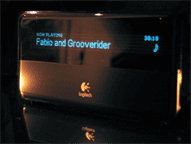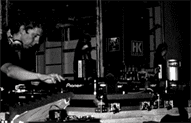What's best - Specialist DJ or Eclectic DJ?
Wednesday, February 22, 2017
by Tat
In this week's Trackhunter Blog we look at whether it is better to be an eclectic DJ or one who specialises in just one or two genres. The reason most people become a DJ is simple, it is usually because of a desire to play music they love to others to educate and entertain them. And naturally many DJs start out in their youth at a time when they are still discovering their music tastes. As those tastes mature it leads some DJs to drill into and focus on one genre and others to explore much further afield in search of eclectic sounds. We thought it would be good to look at some of the pros and cons of the two kinds of DJ.
The specialist DJ
The specialist DJ is arguably the most common of the species as these are the people who underpin any historical or contemporary music scene. When we talk about the specialist DJ were are talking about those who are renowned for just one style of music, whether that be hip hop, disco, house, techno, drum and bass, so on and so forth. They may regard themselves as eclectic in the wider sense if they play the likes of trance, electro and progressive house; or deep house and techno. This is not really being eclectic as sometimes it can be truly impossible and subjective to define what genre a house-orientated track is. The specialist DJ frequents themed nights and radio stations and depending on what specialism can decide which room they play in. At a house night you would expect house DJs in one room, but the back room could be the home for another specialism, hip hop, soul and funk. As more specialist scenes have appeared it had driven the existing ones further apart. The reason for this being the sheer amount of music that comes with it. Scenes older than 30 years old, house, hip hop, techno, disco, drum and bass are all still very much with us. The scenes that do die are usually the least substantial, no less loved, but less progressive. Flashback 30 years and it would have been more possible to stay in touch with a variety of scenes and their releases due to the limited number of vinyl releases. In 2017 that number has multiplied several fold thanks to digital, so staying in touch with everything, even as a specialist can be very tricky, although this is where Trackhunter helps. Nevertheless this task becomes even more problematic if we consider the eclectic DJ.
The eclectic DJ
Unlike the specialist DJ there are not hard and fast rules as to what an eclectic DJ is, it can be very subjective. The eclectic DJ has long been associated with the back room, the space where all the other sounds happen. In the main room we might have house or techno, in the back room it is hip hop and soul, or the eclectic DJ - it is rarely the other way round. The eclectic DJ is one who does not pay heed to BPMs, and to some extent beat mixing. If you are going to switch from disco to reggae then the chances are you won't be beat mixing. The eclectic DJ can be several different kinds of personalities from the hardcore DJ music freak who collects everything they regard as good to someone who happens to have a Balearic record collection and there is a space for them to play this collection.
Scenes come and go
The saying ‘putting all of your eggs in one basket' is not far from the truth if we consider the specialist DJ. One of the first examples of where this started to cause problems was the Northern Soul scene when DJs started to run out of old but freshly discovered soul 7 inches. Ian Levine was one of the scene's leading DJs and was acutely aware of this problem and that DJs were increasingly looking desperate as they included weaker material in their sets. Travelling over to the U.S on record buying trips Levine tuned into the growing disco scene and started to playing the music to his Northern audiences. The reaction to Levine's move was very mixed, but it did ensure he retained his position as one of the UK's leading DJs. Of course Northern Soul has never truly died and has had a revival in recent years, but many of the DJs who did not move in the 1970s just faded away. The same happened in the early 1990s with rave and its various offshoots - DJs squeezed into ever disparate scenes, Happy House, Hardbag and Nu Beat, all of which burned very brightly but for a short time. DJs who had become active in the scenes as producers, promoters and DJs had to look elsewhere as other larger scenes such as trance and progressive house gained the masses attention.
Getting to know your music and crowd
On the flipside, if you are so focused on one genre then you do have the opportunity to really get to know the music intimately. The DJ landscape has changed incredibly in the last decade with the vast majority of high profile DJs also being producers with many starting out that way. Focusing on one style, whether it be techno, progressive house, breakbeat means you get to know the scene as a whole. This includes the record labels, the producers, promoters and the crowd. You become best placed to serve and engage with them and help the scene actively grow and progress. On the flip side if you become synonymous with a genre that starts to die it can mean you risk going down with the whole scene when it folds. So many DJs have had to relaunch themselves once a scene dies, not that they have to learn to DJ again, but to research the next scene which can be harder than it looks.
Being eclectic has no boundaries
Of course if you do set out to be eclectic then there naturally no boundaries as to what you buy. There are of course still boundaries as to what you can play, as that still depends on the circumstances and who you are playing for. Nevertheless it does allow for a greater degree of experimentation as you are not tied to beat mixing for an entire set like a specialist house DJ for example. It is an opportunity to really construct a set that builds up and takes people on a journey. This is the job of the specialist DJ, but if they are playing one genre then it's likely they will operate between a determined set of BPMs to achieve that. It is not exclusive for eclectic DJs to shift between eras but it is incredibly easier and allows the DJ to pick the best moments from not only different genres but eras. The world is your oyster if you get the right DJ gigs but being eclectic does come with its own headaches.
The world is your oyster as an eclectic DJ, but that oyster can be huge
Being an eclectic DJ does not mean you love music more than specialist DJs, but it does mean your are more open to playing different kinds of music. There will always be fresh music to uncover, whether it is 50 years or 5 minutes old, you will never find it all. So as you explore different genres and eras it will potentially leave you with two dilemmas. Firstly how you will ever collect and own this great music and secondly, how do you decide what to play from a large collection? Managing your music collection can be problematic, the more you have, the more you have to manage and sort through. If you are an eclectic DJ you will need a decent physical or virtual filing system. You will also hopefully recycle music through your record box or digital version as the temptation might be to stick with the same old tracks as it is easier and familiar than tackle a messy filing system. The problem with not changing your sets is that in time you will feel less passionate about what you do. So the problem of having too much music from different styles can be negated if you keep on top of your filing and recycling.
Do you want to play in the front of back room?
Eclectic DJs play the main rooms of clubs and festivals, some of the best DJs play wholly eclectic sets. Yet for the most part many are confined to the back room where there is more freedom. The back room, or second room is a great place to play, especially for any fledgling DJ as it is a place where you can freely experiment. We must not forget that many club nights and events are very eclectic in their music programming - often hip hop, soul, funk and reggae sit alongside each other as does house, techno and disco. Nevertheless most big name DJs are aligned to a certain scene or sound and rarely deviate from that. They will play the main rooms of clubs as people often want a clear idea of the kind of music they will hear. You go to a deep house night to hear deep house, not reggae, soul and funk, but that might be in the back room if you fancied a change.
Follow your passion
What ever kind of a DJ you are or want to be should depend on one thing, and one thing only, that you play the music you love. If you are a wedding DJ or one of the remaining mobile DJs then your job is to be populist and invariably play commercial music, music you may not actually like. If you are a discerning DJ, eclectic or otherwise then play the music you love, champion it, educate yourself and perfect your art. There will always be DJs who do it for the money, the fame, the attention by the opposite sex and because being a DJ is ‘cool'. Any artform has that kind of personality, it goes with the territory and whilst the cult of the DJ is strong so will be those with such agendas. I've come across DJs who were doing it because they thought it was cool, that it made them money and popular. In my opinion it just made them lousy DJs as music was not their focus. That of course is not to say that you cannot have all of these things because music comes first - there are hundreds of DJs who make a great living and get paid handsomely on the back of it. For many DJs they do not chose the music or direction, instead it chooses them. If you are passionate about music, whether it be many genres of just one, just enjoy it. The more music you open your mind to the more pleasure you will have and it will in time shape you as a DJ and a person, whether in a club or the radio.
Discover great specialist and eclectic digital music with Trackhunter







